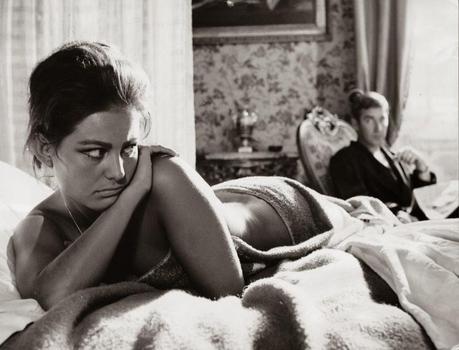 Between The Leopard and his later epics, Luchino Visconti directed several middling small-scale films. Sandra (1965) is an operatic chamber drama, small-scaled but broadly emotive. Perhaps unsurprisingly, it isn't the sum of its parts.
Between The Leopard and his later epics, Luchino Visconti directed several middling small-scale films. Sandra (1965) is an operatic chamber drama, small-scaled but broadly emotive. Perhaps unsurprisingly, it isn't the sum of its parts.Sandra (Claudia Cardinale) is a socialite married to an American businessman (Michael Craig). She returns to Italy for a memorial dedicated to her father, killed in the Holocaust. While visiting her family estate she runs afoul of her stepfather (Renzo Ricci) and half-crazed mother (Marie Bell), who supposedly betrayed her father. Sandra also encounters brother Gianni (Jean Sorel), a ne'er-do-well about to publish a novel depicting unwelcome details about their relationship. Unfortunately, Gianni's feelings towards Sandra aren't entirely in the past.
By any measure, Sandra is an odd piece of work. Visconti loosely draws from the Elektra myth, two siblings avenging a "murdered" father, mixed with his obsessions with family discord and aristocratic depravity. Visconti can't quite reconcile his desire for grandiose melodrama with the modest staging. It's all overripe dialogue, overheated drama and flamboyant gestures in a few rooms and shadowy gardens. The same jarring opposition sunk Visconti's later Conversation Piece (1975).
As usual, Visconti provides delectable direction. Armando Nannuzzi's black-and-white photography makes of the restricted environment. He casts the crumbling chateau and courtyard in oppressive shadow, literally spotlighting relics of the past: statuary, paintings, mementos. Hence a perfect visual counterpart to his characters succumbing to their sordid past. The soundtrack mixes raucous swing music with Cesar Franck's classical pieces. Even minor Visconti's always a sensory treat, and Sandra does not disappoint.
Sandra works okay as baroque character study: Sandra wracked by resentment and guilt, Gianni a wastrel more pathetic than monstrous. Yet the drama finally veers operatic to outlandish. It's probably impossible to treat incest, implied or explicit, delicately. And Visconti doesn't treat anything delicately. As The Damned falters when Martin rapes his own mother, so Sandra crumbles when Gianni makes his affection explicit. The finale, juxtaposing the memorial dedication with Gianni's fate, is just a tasteless parting shot.
Claudia Cardinale handles a difficult character well. She provides Sandra's overwrought resentment with a thread of humanity running underneath, keeping her this side of credible. Nor has Cardinale smoldering pout been put to such great advantage. Jean Sorel (The Day of the Jackal) also faces an uphill battle: his character rapidly degenerates from creepy cad to sniveling wretch. Michael Craig's stuck in the straight man part, while the supporting cast mainly overacts.
Sandra mixes Luchino Visconti's best and worst tendencies in an unusually demure setting. It results in a feverish drama that's well-crafted but painfully overwrought.

